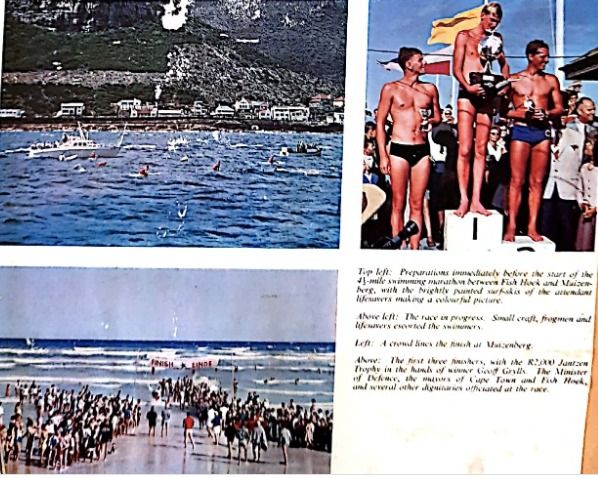Geoff Grylls
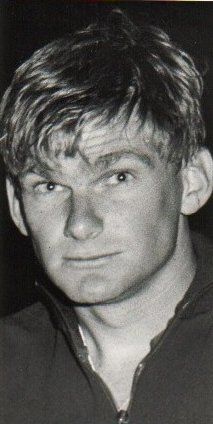
Geoff Grylls

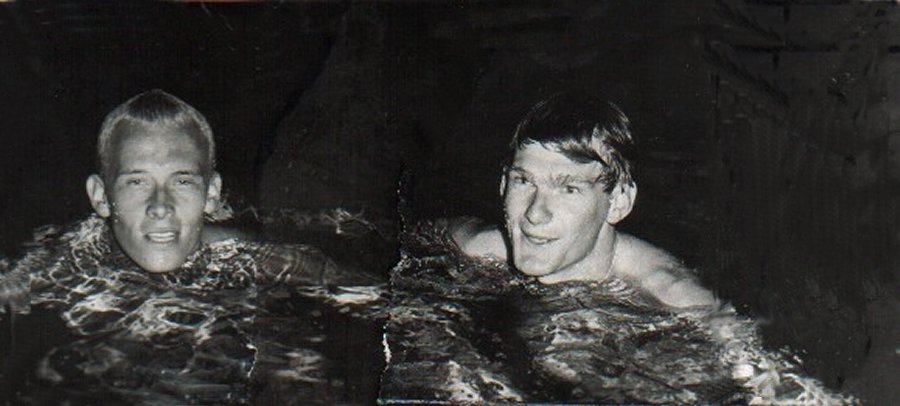
Geoff Grylls is a local legend from Redhouse, outside Port Elizabeth. He was a Springbok swimmer and lifesaver, a sailor, and a very successful international businessman. He also won the Redhouse River Mile six times, and he swam the race again in recent times.
Geoff matriculated at Grey High School in 1961, swimming with coach Peter Elliot at the Barracuda Swimming Club. He graduated with a BComm degree from the University of Port Elizabeth (UPE).
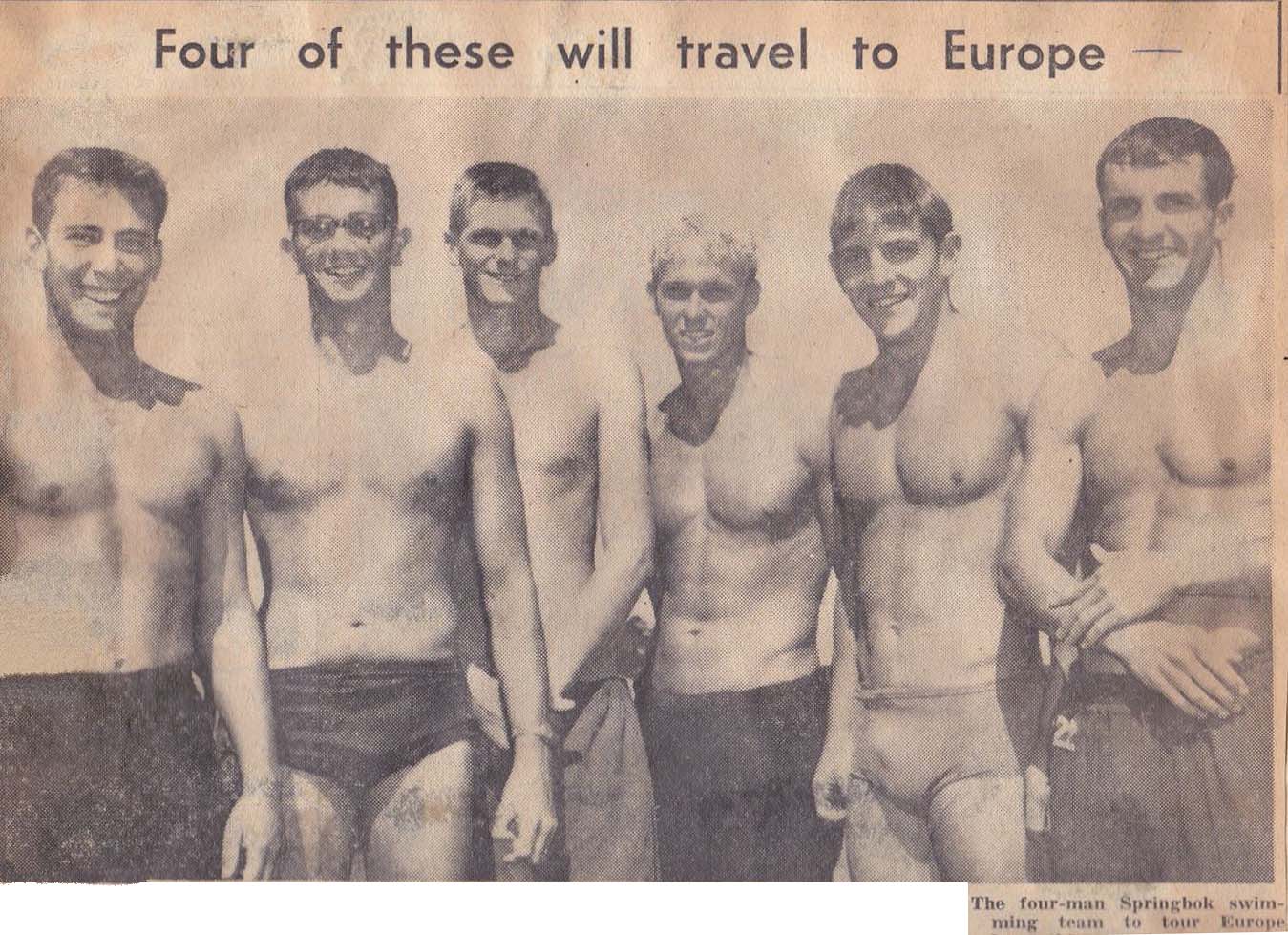
1964 Springboks swimmers to take part in British Championships: L-R: Basil Hotz; Brian Stewart; Geoff Grylls; Jon Reen, Vernon Slovin; Neil Oldridge (latter was only 0.8 off world record for 110yds 'Fly). This team, together with Tich McLachlan and Tudor Lacey, won 9 out of 11 possible gold medals in the championships.

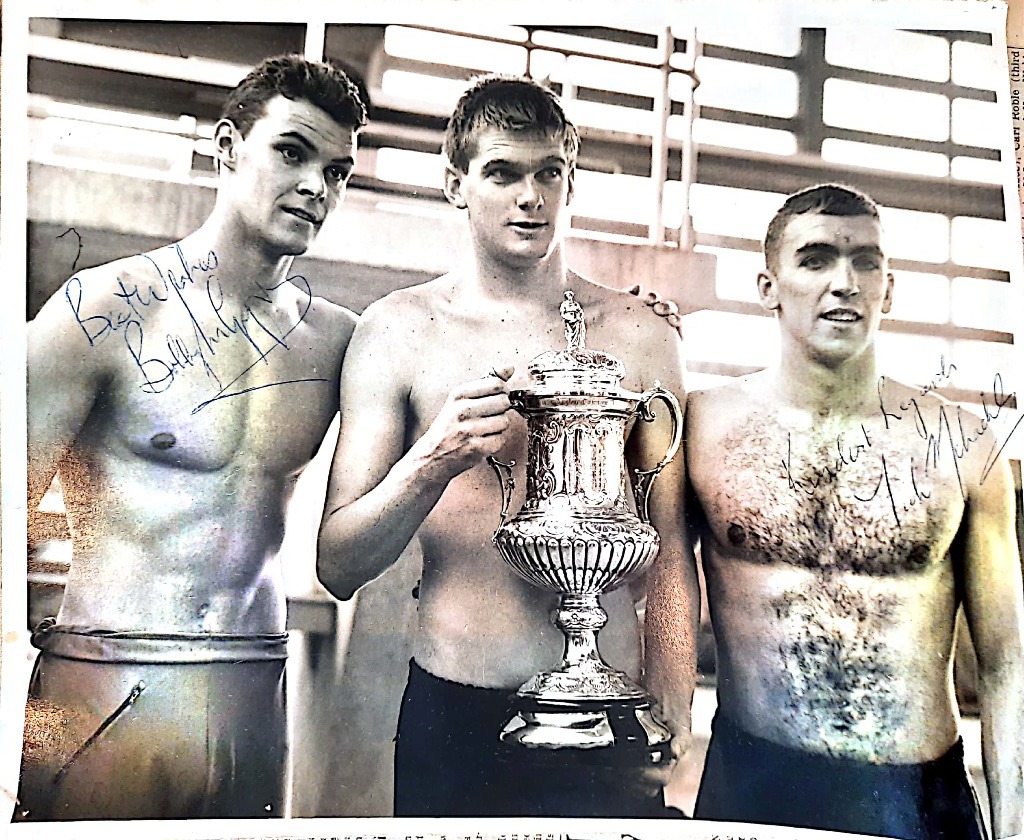
1964 British ASA Championships, Crystal Palace - 220 yards Freestyle - 1st Geoff Grylls (South Africa), 2nd. Tich Mclachlan (South Africa), 3rd Bobby McGregor (Scotland).
In 1965, Geoff Grylls won this event again, with two Canadian swimmers in 2nd and 3rd place.


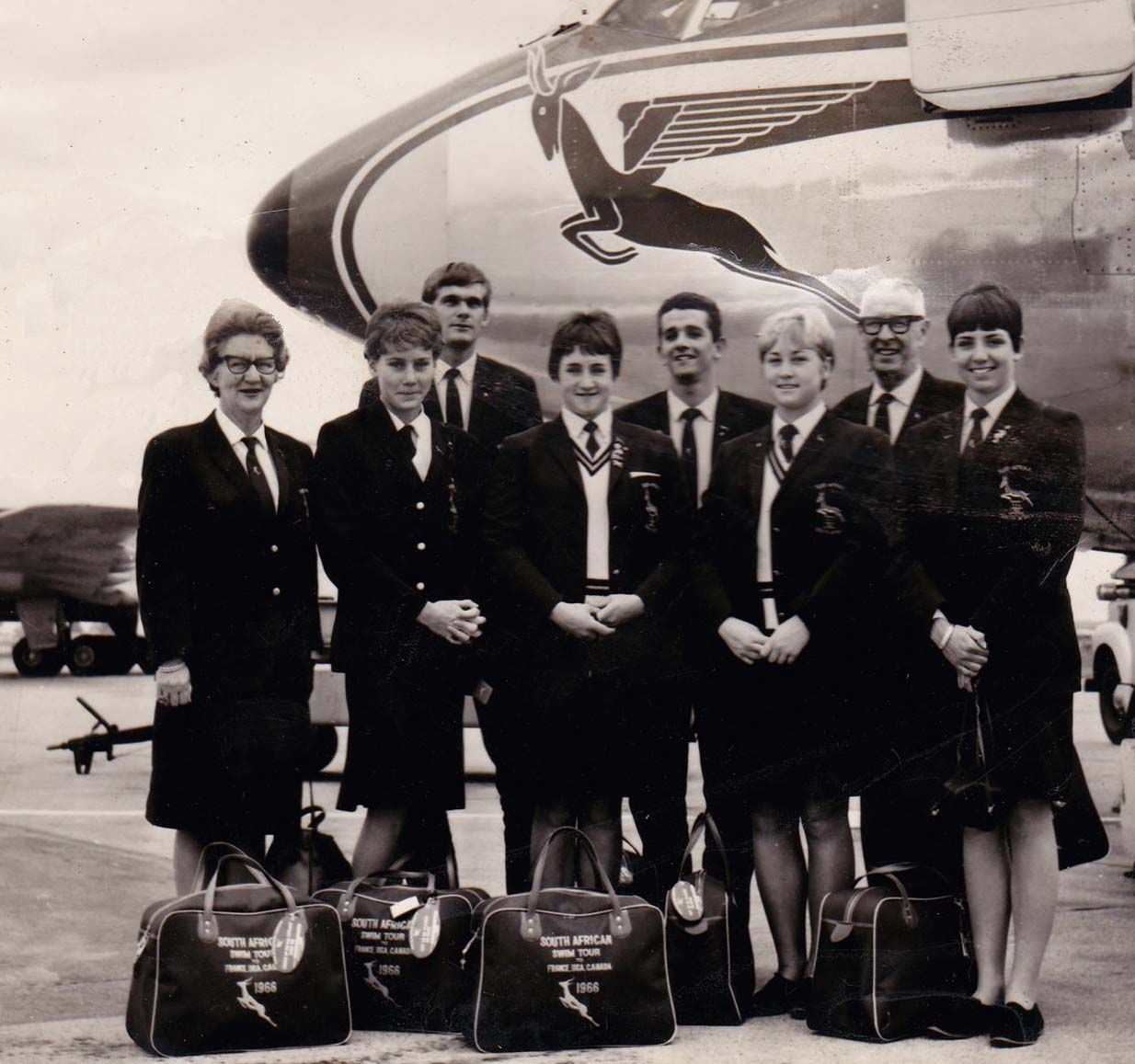
Springbok team 1966 to USA and Canada: L-R: Mrs. Doods Bulley, Karen Muir, Geoff Grylls, Dianne Ludorf, Brian Stewart, Shirley van der Poel, coach/manager Alex Bulley, Ann Fairlie.
Geoff Grylls
An interview with Thys Lombard at Knysna in October 2020
Thys Lombard
Geoff Grylls what an absolute honour to be here with you in Knysna. You're looking like you could swim anytime soon. You looking fighting fit. Not too many people could claim to be the best in a sport, you've been the best in a couple of sports. But Let's Dive Straight in. Where did it start for Geoff Grylls the swimmer, because we want to touch on the yachting and surf lifesaving later? But as a swimmer where did it all start for you?
Geoff Grylls
Well, I grew up on the Swartkops River. Just the outside Uitenhage and Port Elizabeth. There were eighty houses.
Thys Lombard
Can I correct you didn't grow on the Swartkops river you grew in the Swartkops River?
Geoff Grylls
Ja, it sort of got to that in the end. So everybody there It was a very big yachting community, and your parents always poeped themselves that you were going to fall in the water. So they taught you to swim at a very early age so all the kids that grew up there was water competent, we had canoes and we could sail and we could swim and all of that. And so, I started swimming I went to Grey junior school. And in I won the school title in standard three, it was the old days of standards and. Okay, I think okay I can swim, so I won it again in four and five, and without any ambition, I sort of never trained, you know, then went to senior school and you can talk a lot about luck that happens. Grey had just finished a new 50-meter pool and was a boarder so we were encouraged to go and train. And then there was a teacher called Brian Thiel to the sort of took an interest he knew nothing about training but he took an interest in us and he made this train and then there was a fellow called Sandy MacGillivray who was a coach and needs to come and help us. And then suddenly I started winning EP titles and then I think I was in standard nine I won my first school's title. And once again, there was no more ambition beyond that, you know, but we would go and train and then and then and matric I got chosen to swim for Eastern Province, and went to nationals in Kimberley and came third in the 1500 which suddenly caused a bit of consternation sort of look, where did I come from you know, you're an emerging swimmer and then Peter Elliot took an interest in me Then the following year, I to do my national service. So went to the Air Force Gymnasium. And it was quite interesting because there was a Japanese team coming out, swimming team, they were declared honorary whites, and they were coming out just after nationals in late February March, and I thought maybe I could make the team to compete against them. But when we got to, and I learned a lot from this, because when we got to the Air Force they were not particularly interested in my swimming. I had to do route marches and in all of this basic training.
Thys Lombard
Swimming wasn't a big sport in the Army?
Geoff Grylls
It wasn't really that big! And anyway, so but I got tremendously physically fit. So although I could only swim a couple of times a week I was physically fit. Then an interesting thing happened. Northern Transvaal had sort of cottoned on I was there so they chose me to swim for Northern Transvaal. But Eastern Province had chosen me to swim for Eastern Province, and Eastern Province then said that I wasn't eligible to swim for Northern Transvaal and they had a ruling on it. Northern Transvaal then said that if I'm forced to swim for Eastern Province, I will be AWOL. Okay, so this is the day before SA Champs starts. They were having a big meeting and I don't know if I was going to be AWOL or I could swim for EP or swim for Northern Transvaal; I'm changing hotels from team to team. Yeah, so luckily, the head of the Air Force Gym was the head of the South African Athletics Union, so when he heard about he said: Laat die kêrel swem.
Thys Lombard
So was this Currie Cup, nationals?
Geoff Grylls
Ja, nationals. So I went and swam for Eastern Province and I won the 200 400 1500 - no, I was placed in the 200 and the 400 and I won the 1500 but was chosen South African Male Swimmer of the year because I accumulated enough points. And so then I left, and then I went back and then I started getting offers of scholarships in America but you know my dad had been through the depression and through the war, and he said you're not going to America haven't got the money to send you. So, you must go to - Rhodes had opened a small university small little sector of the university in PE. So I ended up going there. So I had to catch a train at Redhouse at seven o'clock in the morning and then walk up the hill to university. And then, because my subjects coincided with the guys who were doing their CA's, I did a BComm, and then, and then, so we'll come back to the swimming, but then after two years, it became UPE. Okay. And they wanted me to stay at UPE. So I stayed at UPE. But of course, the whole time I was at university I spent all my time overseas swimming I had to do my degree in four years because I couldn't take five subjects each year. So anyway, then 63, we went to SA Champs in Pretoria and I won the 200 400 1500. Look it was 220 yards, but I'm only going to talk meters.
Geoff Grylls
200 400 and 1500 and so then was South African Swimmer of the Year again. So then we were chosen to go to the very last, listening to Peter Rocchi talk, to the very last World Student Games South Africa were allowed to go, in Brazil. So I went over there and I got flu just before the event so I didn't do very well. But we came back and then started preparing for 64 Champ but at this time, I was living in Redhouse and didn't have anywhere to train so I trained in the river, almost exclusively in the river, I used to go to Peter Elliot earlier, maybe once a week and he'd correct my stroke and give me some time trials, but just swimming in the river. So I learned a massive discipline. The rivers about 100 meters across and 50 meters between the jetties. So then I'd hang a watch down and then swim. So, all my life my swimming was more about my strokes. So I'd say, I know how many strokes it's going to take to swim across the river and then I time myself, and then I'd swim back, and say OK now if I'm doing the 200 that's the time I must do. And the other thing that all my training has always been in splits. So I get in and say, I'm going to do 10x200 today. So I do 10x200 say one every five minutes. The timing myself all the time, or sometimes I'll do five 400's or 20x100's, and sort of train like that.
Thys Lombard
All by yourself?
Geoff Grylls
Ja, all by myself. So, for instance, in 64, you know sometimes some of my mates would come down and swim with me, but I'd say 90% of the time I'd be on my own. And then I'd say I needed to do a long swim, so I'd swim up the river for a mile and then swim back again. So that's why I won the Redhouse River Mile six times because I knew the river backwards. I knew where the currents were.
Thys Lombard
Was it swum exactly where you were training?
Geoff Grylls
Ja where I was training. So, The funny thing about that was when I knew I could beat everybody and everybody would follow me. I used to take them the wrong way down the river into the wrong currents and all that so that my teammates would have the advantage, and Redhouse won.
Thys Lombard
It's a lot like the Durban Surf guys
Geoff Grylls
Lifesaving champs against Durban at North Beach you had no chance, they had it so sussed. Anyway, so that year was the year that I won that 100 200 400, and 1500 in 64 in Port Elizabeth, so I was a big hero. The mayor had a cocktail party for me. So, and I believe that Ryk Neethling is the only person that's done that. Won the 100 200 400 and 1500. So, I suppose I've got a record that nobody can beat. Oh yes, and then Eastern Province when the 4x100, 4x200, and the 4x100 medley. In that year I've got a feeling that 40% of the points won at Nationals were won by Eastern Province swimmers. We were just, like it happened, it was amazing. Johnny Reen, who I beat in the 100, then broke the South African record swimming first in the 4x100. Neil Oldridge was the South African butterfly champion. Derek Coertze came second in breaststroke, so we had just a funny team and we all went off to Rhodes. So Rhodes that this amazing team.
Thys Lombard
An incredible bunch of swimmers, and most of them coached by Peter Elliot?
Geoff Grylls
Yeah, most of them were coached by Peter Elliot.
Thys Lombard
So so I think that one of the intimidating things for pool swimmers is actually doing the transition to Open Water swimming because it's scary when you don't see a black line and swimming in the Swartkops River you never knew when there were Bull Sharks swimming with you?
Geoff Grylls
You know, funny, I've often thought about that. If I knew what I knew now, because I had a house on the Breede River, okay, and they tagged a massive Bull Shark swimming past my river, at my house, so I never swim. I used to swim, they had a race there, at the Breede River, at the mouth of the Breede, a mile swim. I don't know if you swam it? I used to swim it and tell everybody it didn't matter, I was always the older swimmer so I always got two bottles of wine. So, I used to look for a nice plump teenage girl, and I'd swim next to her because I thought if a Bull Shark was coming it would choose her. So, yeah, there was that thing about swimming all this time. Can you imagine when I started swimming and we thought they were Bull Sharks and the river, I probably wouldn't have been a swimmer?
Geoff Grylls
So okay. In, 64 the Springboks went over to swim in the British Championships. We won nine out of the 11 titles. I won the 200 400 1500, all in British record time.
Thys Lombard
How come you guys were allowed to swim?
Geoff Grylls
Because you swam for your club, so Redhouse Swimming Club won the 200 400, and 1500 at the British Champs. And in the 200, I beat Bobby McGregor, who was the world 100 record holder at the time. Okay. And then we were kicked out to the Olympics and that was like one of those things it's very hard to describe. Yeah, what the next eight weeks were, knowing that we weren't going to the Olympics
Thys Lombard
Was the British Champs just before the Olympics?
Geoff Grylls
It was eight weeks before that.
Thys Lombard
It was part of your preparation to go?
Geoff Grylls
The Olympic team was selected and we were all ready, and everyone was ready and we went over there and so, suddenly, having swum here, you suddenly realize hey you're not that bad, you bring your times down enormously to go and swim over there. And that was a very hurtful time when, and then Bobby got, you know, a silver in the Olympics, and you realized, well, if things had gone right you know, you could have been there and you could have unwritten all of that.
Thys Lombard
And how did you handle that disappointment?
Geoff Grylls
It was immense, it was, it's very hard to, it is very hard to describe. It was, it is very difficult to describe it. I sidetracked a little bit because you asked me the question about swimming in rough water. British Times was a magazine that came out, Swimming Times, about swimming, and they said: Geoff Grylls appeared swam and won three titles but nobody could identify his stroke. He had the ability to lift his head and look around without changing the stroke, and that came from swimming in the river. And so I had, you know, just some second nature, I sort of looked around to see where people were, which was very unusual.
Thys Lombard
Anybody in your family that swam, your dad?
Geoff Grylls
You know, my brother's swim. My folks were all keen to swim in the river, but my brother swam but he had the unfortunate thing of being five years older than me and going to Grey when they didn't have a pool. So, you know, it was...
Thys Lombard
It's that thing in life, in business, and in sport, with it being in the right place the right time. You can be the world's best swimmer but if you don't have a pool to train in it was going to be difficult. A lot of people, a lot of champions, always acknowledge the fact that somewhere in their life they had some luck.
Geoff Grylls
Yeah, yeah. The two things to me, that was the first, having had the pool, and then living on the river. Just being able to swim. The funny thing is, training in the river, all the swimming that I'd done up until then, I've enjoyed swimming in rough seas and water, that's why lifesaving was an easy switch. We've known about, as you say, the black line swimmers struggle.
Thys Lombard
They have struggled, they could be really good pool swimmers but they struggle, and also the knocks, the elbows. I wasn't good at water polo, I didn't like those knocks and you need that in water polo, but in surf lifesaving luckily I was fast enough to be in front so I didn't get klapped too many time but I got klapped by Oscar Chalupski. It's intimidating to swim in open water, breathing to the right side if the wind was blowing, there was always wind or chop
Geoff Grylls
Yeah, yeah. Always remember the Fish Hoek Mile, because I breathe to the left, and you swim across, and if the Southeaster was blowing, I don't know how many Fish Hoek Miles I swam, but I was always breathing into the chop. And, you know, bilateral came after us really, you know the swimming breathing on both sides. Peter Elliot got us training for high-altitude swimming, like when nationals were in Pretoria he wanted us to swim bilateral to learn to use less oxygen. But now the interesting thing with that too. When later when I was winning those races in, California in San Diego. And this was 2010 11 and 12, and I was training in Croatia, off my yacht. And I started anaerobic training. Okay, so I do my 200's, but I'd breathe the first 50 once every six strokes, and then once every four strokes, then bilateral, and then the hard one would be the sprint.
Thys Lombard
We call it hypoxic 3,5,7,9 every length you breathe three, and then five and seven and then nine. It gets tough when you only breathe every 9th stroke but you get fit really quickly
Geoff Grylls
You do get fit quickly. Nobody taught me that you know that just, it's just what I did.
Thys Lombard
It's incredible. I mean I can see you absolutely light up when you talk about swimming and I think I guess when you swam at the level that you have it in your blood. Do you still swim now?
Geoff Grylls
Well you know, I've had these medical problems the last couple of years and I feel the cold quite a lot. So, swimming in Mauritius, because it's warmer, but the last race I did was 2014 it was the 90th year of the River Mile and they asked me to come back, and then I came 85th out of 440 so it was okay you know I was still swimming very, very hard. So, in 2000 I sort of jumped from swimming to lifesaving. So in 2002 2004 2006, I swam in the world lifesaving championships, that was in Daytona Beach, in Italy, and then in Australia. And I was doing very well. It was just in Australia I got a bit pissed off because this guy beat me on a wave, but once again just diving off my yacht in Croatia and in training in the sea. Completely random complete random, yeah. And then my business partner in America Jake, who I said had swum with Tich McLachlan for Natal, he suddenly started swimming again, and in fact, right now he's assisting the American Olympic coach, he'd is gone into coaching, with Tudor Lacey. I don't know if you remember Tudor Lacey? Tudor was a Springbok with me, and they're both in San Diego. So, Jack said we must come and do the La Hoya Mile. They call it the rough water swim in La Hoya in San Diego. A sea swim. I went there in 2009 and I'd cut my elbow quite badly when I was on the yacht, I cut it on the, on a rock. And so I wasn't really very fit and I rocked up and there was a guy there who was a world Masters champion. And he greeted Jake because had won the American Masters 100 backstroke Championships and he treated me like I didn't exist.
Thys Lombard
That fired you up a bit!
Geoff Grylls
So, I helped Jake. Jake had always been a swimmer. I said: You don't have to pace yourself. So I swim with him for the first two-thirds of the race, and I said now's your chance to swim, and he won it. And so I said, I'm going to come back next year and beat this guy because he really pissed me off. So I then started training very hard and my mate in Croatia, the youngster, he got all excited, and he started swimming with me, which is a bit of a motivation. We used to swim around this island. So we swim in the lagoon and out around the island into the rough sea and back again. I beat the guy by 45 seconds in San Diego, the next year. That was 2010. And then he got to know my name and he greeted me so the next year we came he showed me a bit of courtesy and I beat him again. I never let him beat me again.
Thys Lombard
You had to earn your respect. That's a wonderful story. Tell me about the transition to surf lifesaving. How did it happen?
Geoff Grylls
I think where the hard part was, as you spoke about, was actually running into the water and running out. This the swimming itself when you got your stroke. I love the waves because I thought they were a great leveler, you know, and being able to do a bit of anaerobic swimming, not having to breathe every six strokes and all of that different waves coming up. But you're learning all of that took me a little bit of time. But what happened is I had two really good mates, that were at boarding school with me, Pip ? and Ant Foster and they were Summerstrand lifesavers, and they encouraged me to go to Summerstrand, so when I came back from the Air Force I started going to Summerstrand and in 65 I think I got really big into lifesaving. And then I really enjoyed it, that I really enjoyed. And the funny thing is, is the San Diego Mile. There were 250 people in our start. Okay, it's a staggered start because I was swimming in my age group, of course. And, and I went out and surveyed that there was a gap between the rocks on the right-hand side, and I'd swam in and out of that a few times. So everybody would get into this massive barney and I'd swim around the rocks and come out first. I mean, I don't know, nobody even noticed, though just coming out first.
Thys Lombard
It's like guys from Durban Surf going next to the pier. Instead of running into the water, they would run across the pier.
Geoff Grylls
Exactly. I couldn't work out the first time I saw them at SA Champs 66. Where the hell were all these guys going? It was a swimming race, not the long run! And, and the other thing that I enjoyed with the la Hoya Mile is actually having to find, and that's what surf swimming taught you, to find where you were. Okay, so I used to go out before the race, most of the guys, and then you have a tall building or something that was your focal point. So I used to go out and pick up these focal points for coming back and you could see people who weren't used to it sort of straying this way and that. And so enjoyed, Yeah.
Thys Lombard
And also, I thought I could body surf until I went to Umhlanga one year, or Amanzimtoti, I caught one of these, I mean I was with the lead swimmers but I ended like 100th because it took me two minutes to surface after I tried to bodysurf that wave. And Durban Surf guys, Julian Taylor, and these guys would go across.
Geoff Grylls
Yeah, we just, you know, when you spend time at North Beach, you realize how lucky they. They could go every day and get a wave. You know we come from, you think, Llundudno's got stunning surf at times, big dumpers at times, but they weren't always there. So you couldn't train for the surf, you trained when it came.
Thys Lombard
Even with a wetsuit, you could spend like half an hour, the water was just too cold. And these guys could spend the whole day, all year round. But it's beautiful to watch. Anybody at the peak of his powers in his sport is always beautiful. Yeah, so I still enjoy watching surf lifesaving. The yachting bit, where did that fit in?
Geoff Grylls
Well, what happened is I grew up on the river, and so, sailing was sort of second nature. My mates, there were a few Southern African champions around us. And my mates sort of were more sailing and I was more swimming, and I had my own yacht when I was really starting to swim and then I sold it because it was interfering with my swimming. My father couldn't understand it.
Thys Lombard
Were you young when you got your first yacht?
Geoff Grylls
Ja, ja - I was about eight to something. My dad bought one for my brother and me, but it was a really rickety little boat, but it really taught you how to sail and to trim it and we had to fix it. Then you know they were wooden so you had to paint them and do all that work.
Thys Lombard
There's a lot of discipline in that. You can't just have the nice part of sailing. Your dad, I think he taught you about life. Like with a business you can have a business but with a business there comes a lot of not nice stuff that you have to do.
Geoff Grylls
Yeah, my brother went on and became much more adept at sailing than I did. And then he drifted into life-saving, but not as a competitor, as an official. So he was very involved with Summerstrand. So, then sailing would sort of come back in and out of my life, and I'd bumped into some guy who'd say: Don't you want to come sail in so some races, and I say Ok.
Thys Lombard
It was always competitive?
Geoff Grylls
Ja, there has to be a race! And you know, and the other sports I enjoyed was water polo, but I didn't have a good arm. So I played for Wits when they were undoubtedly the best club in South Africa and there were seven Springboks in the side, but they were better than me, you know, I couldn't pretend to be. When I chatted to Oscar the other day, and he was good, he was a good water polo player. I wasn't that good. I could obviously outswim the people and all of that, but I just didn't have the extra bit. So, and that sort of, it's quite a leveler because you then have to assess what makes you a good sportsman or makes you not such a good sportsman.
Thys Lombard
I think there's a lot of technique. I mean the guys get out in the water and they flick the ball, and sometimes they get out of the water and you think, jeez, they're not that big and strong but they've got technique. And you see it in cricket, you see it in a lot of other sports.
Geoff Grylls
What I find fascinating. fascinating. I mean, when you look at the bold of lifesavers, I mean, water polo players, and if you look at a guy like Lionel Messi. He doesn't look like a super sportsman. It's just he's got some ability to do certain things with the top rugby player generally looks like a top rugby player.
Thys Lombard
I think the thing that we all, not miss, but we tend to not talk about is what happens up here, you know the confidence. And some people get confidence through training. I think your confidence came from swimming in adverse conditions, in the river, not ideal Jeez, I can take the cold, I can take the wind, I should be killing these guys. You know, once it picks up here, confidence thing is more important than anything.
Geoff Grylls
Yeah, but you know we've come back to the disappointment of that time. Because then in 66 we went to swim in America in the American Championships. In the 200 there Don Scollander and John Nelson beat me but they both also broke the world record. I beat Mark Spitz, but it was his first American Championships. And I beat Mike Wendell, who had just won the Commonwealth Games 200 meters. And so I was right up there, and then they announced again that we were out of the Olympics again, and funny enough Don Schollander's coach offered me a scholarship, but Mark, Mark Spitz's coach offered me an MBA scholarship, in America. But I was so pissed off with everything, I said I was not going to swim. You know it's very hard to look back and say, why did you not do it but.
Thys Lombard
Let's move on from swimming. You became as successful in your business life as you were in your swimming and yachting and surf lifesaving. How did that come about?
Geoff Grylls
You know, from an early age, I didn't want to work for anybody, I wanted to have unlimited earnings. So, as soon as I had a job, I didn't like it, you know, I knew that was what I gonna make. So I was playing water polo, and I'd sort of got to the end of my BComm and I didn't quite know what to do and I was playing water polo with a guy who worked for a company called NCR, and they were just going big into the computer market. Now, computers in those days, that NASA had less power than this iPhone, you've got to remember. So you sold a computer the size of the room, with air conditioning and underfloor channeling and it was a hell of a thing, but it was major breakthroughs, but they paid major commission's, you got 10% commission. So I went into that.
Thys Lombard
You sold computers?
Geoff Grylls
Yeah, I went into computers. First I had to learn how to program, and then to sell. And then I did almost too well in Port Elizabeth because they sent me to Johannesburg. And after a few years in Joburg, I said I miss my surfing. Growing up in Port Elizabeth Jeffrey's Bay and Cape St Francisco, where my own home. Peter Elliot used to go mad when I say I'm training a Jeffries - You can't on a surfboard!
Geoff Grylls
So I wanted to leave, and I got offered the job leasing company in Cape Town and I went down there and worked there for three years. And then three of us started our own company. The company ended up as Nedfin Bank, it was bought by Nedfin Bank so I ended up in Nedfin Bank. It was very nice and all of that, but it was so corporate. It was just too corporate for me. So I left and we started this company, and it was a finance company and its very very high-tech financing. That's when I'd had a lot to do with GG Perreira and those guys. Yeah, they had a similar company to us so we did a lot of work together because we were competing against the big banks in South Africa at the time. And that was a very successful company and we made, we made a lot of money, and we sold, we sold it out. And then I did quite a lot of property development which is, is an aside, but I was handling the finance side of the property development. If you look at the Camps Bay, where the Bay Hotel, it was that whole thing three of the three of us did that development, for instance, one of the more prominent developments. And so we made some good money out of that. And then my auditor came to me and said, there is a very interesting situation here. There is a company called Dawn Diamonds, which was the first company that successfully mined diamonds diving for diamonds. And it was on the west coast, and there was a Swiss consortium that was major shareholders they had set the whole thing up. But they had a big dispute with a South African guy, who hadn't really paid the taxman what he should have paid and it was a big uproar. So I got involved to do an asset strip. So that's when I first did the deal with Christo Wiese because he'd been in diamonds and said Christo, listen I don't really fully understand, so I said come in and do this and we did it. And we made a lot of money by doing an asset strip. In other words, it was finding out what were the fundamentals, it was a group of companies, fundamentals from each selling off this one selling off that one putting it all together, and I paid the Swiss guys their money back. So they were most amazed, they said jeez, we've got more concessions of the west coast in Namibia, Don't you want to run the diamond company? I said I don't even know to spell diamond. I didn't get into this because of diamonds, I got into it because of the business side of it and the diamonds were a fundamental part of it. Again, it was a fishing company and a retail jeweler and all sorts of things. So they said they would like me to start. So I started Ocean Diamond Mining which is also I can write it, I should, look people say I should write a book about it because everything happened while we were raising money in London. When PW Botha did the Rubicon speech, having been in London with everybody very intrigued by my story when I went back and this was Barings bank stockbrokers. I went back to see these people they didn't want to know so I don't know what's happening in South Africa, so I felt the full effect of what the Rubicon speech did at that stage. But we managed to get enough money but we had to limp along. We then struggle back, we just started getting going again and Namibia became independent. Okay, so we had concessions from South Africa, operating in Namibia. I spent months in Walvisbaai with comrade Toiva yo Toiva and other people, explaining, I'm actually working for Swiss people, and the company is based in Guernsey, and anyway, we did, we go it all going, and we pioneered. De Beers was doing it on the one side and we were on the other d, but all I had to do
Thys Lombard
Were you in competition with de Beers?
Geoff Grylls
Well, you know you aren't really in competition because de Beers controls it so much that you're quite happy that they're controlling it. So, we were in sort of opposition but not competition if you know the mean. So my job was to find the right people. So, I found a general manager, I found a top geologist, and sort of put them together and said okay, guys, you take it from here. And in the end, it became very, it can be a successful company, and we sold out in 96, so it was about 12 years. Then, I was still doing a little bit of property and development on the side, but my friend Jake was talking about it in America. He was, MD of Rentokil in South Africa pest control company and then they sent him over to be president of the American company and after about three years, I used to visit, go and see him and after about three years he said, You know, these Brits are doing it all wrong, they're not they're misreading the American market. I want to start my own company. So, fortunately, with my travels, raising money for the diamond business, I'd met quite a few wealthy people, and they will say, hey, we like you, we will sponsor you. So I got people to sponsor Jake to start the business. And then, I had carried shares, you know, because of South African exchange controls. So Jake always gave me carried shares until I went to work there in 2000 when I was able to execute and get shares, so ended up being the second-biggest shareholder in that company. And he saw a gap. He built the company. We started the company with four people and we were over 1300 people when we sold it. And he saw the gap, that food safety was a marker to go into. So we only dove in to help them get into food safety. And what food safety was a market to go into. So I went over to help him, get into food safety. What food safety implies, people were coming to him and saying, Oh, you know, there's food safety is becoming a big thing. Can you imagine McDonald's got 10,000 outlets, and some guy poisons somebody in the restaurant, everybody in trouble. So they were asking, the more enlightened pest companies to get to see if they can't do more of the food safety thing. But Jake realized it was a totally different business. It's aligned but different. So he employed really top people. It was a bit like Ocean Diamond Mining, I got there helped him employ the right people, and they said hey we're making so much money I can go sailing. So that's when I did a complete u-turn in my life and I just went to the Mediterranean and sailed.
Thys Lombard
Was that competitive sailing?
Geoff Grylls
No, I had been in competitive sailing in Antigua, and Cowes and other places. So for the next 16 years 15 years, I worked out I spent one thousand five hundred nights sleeping on yachts. So that's how it became part of my life. Mostly in Croatia, we sailed all over the whole Mediterranean and I sailed in Thailand with friends, and the Seychelles, and West Indies. The nice thing about Croatia, it ended up like having a wet caravan. You lived on the yacht, and then you sailed into these little ports. I've been to over 200 sailing destinations in Croatia, from the big towns like Split to little bays, and it was unfounded. When we got there it was just after the war. You know they'd had this terrible war with Serbia, they were very introverted, but if you look at it geographically you've got Hungary, Austria, Czechoslovakia, Poland, and southern Germany - that's the coast for all of those people. So now, if you look at it. You know, I've got a sail making business, it's the second biggest sailmaking business in the world called Ulman Sails. So we know the statistics. It's actually based in California but we're running it out of South Africa now because the biggest factory is in South Africa. 3644 charter yachts are in Croatia, although they haven't had such a good year this year, but 36% of the boats that are charted in the whole Mediterranean are chartered in Croatia. So, it suddenly blossomed. Croatia suddenly blossomed. I was sort of there at the beginning, so I had friends always wanting to come sail. People coming over all the time on their yachts. It was really good.
Thys Lombard
For someone who loves water and swimming that's a dream lifestyle!
Geoff Grylls
Yes, it was. So what would happen is that we would anchor the boat in some bay and I would dive off and do half an hour training. The other guys would have had a beer, that's all I would have missed, is one beer, but I'd gotten my training. I always liked, I didn't always want to be competitive that I always had to go to this Masters and go that Masters, but I like to have something out there, like going to those World Champs for lifesaving, was okay - I've got World Champs in 18 months, now that gives me something to train to. And those swims in San Diego were the same. And then we went to do a very interesting swim from Lanai to Maui. So the race is nine and a half miles, we don't all of it, six people swim it, every fifteen minutes they blow a thing and you change. They had individual swimmers, but why that one was so particularly good, the race has been going on for 40 years, it's a really famous this race, and I swam for the University of Wisconsin Old boys. Okay? I've never been to Wisconsin but Jake into a place up in Jackson Hole, and one of his mates had been to Wisconsin University, and they, for their B team was looking for people so we ended up swimming me for South Africa, Jake and another guy from San Diego, the other guy from Jackson Hole, one from Vancouver and one from Wisconsin. And we swam. This is a very interesting race. We swam for five hours, 22 minutes and 13 seconds, and lost by a hundredth of a second. Because our guy was running out and there was somebody running next to him and thought, why will fight for the bell, you know, and so he sent me a towel, which I've got upstairs from the hundred-second boys. Interesting, the guy in that team was Graham Johnston, who swam for South Africa the 60 Olympics, and he picked up who I was before I picked up who he was. So he knew, he looked at your team, and he said hey, this took quite a good team. And that's why they chased us. But the interesting thing with that race is, through all my sailing and all of that and my surfing, I read WindGuru. I don't know if you go onto Windguru? And if you go onto Windguru, the default page is north shore Maui. Okay, so about a week beforehand, I'm going on, and I was checking how my mates were sailing in Croatia, but before I that I to see what is happening in Maui. I said, hey guys, do you know what's happening in Maui on the Saturday before our race? You must see the storm that's coming through.
Geoff Grylls
They said: Beautiful swimming here, calm water you can see your hand coming through. I said: It's not going to be like that. Nobody would pay any attention. Well, let me tell you, during the race, and it's a very famous race, so the Australian Olympic team was there, the American Olympic team, Dutchman Olympic team, the Dutch boat sank with all their passports and everything. Another two boats got washed onto the rocks, one guy in his arms chopped off by the prop of a boat because I mean, you were in waves like this. Jake could only some backstroke because he got seasick when he swam freestyle.
Thys Lombard
There are a lot of factors when you swim in the sea. People do get seasick.
Geoff Grylls
Ja, it was a hell of a race. And anyway so that we had that race. And then two days later they had a thing called Amakula Mile, which I won, with all the new swimmers there, which is quite nice because by then the storm had gone and it back to being Hawaii.
Thys Lombard
With all these open water swims, and I see you love these swims from the Fish Hoek and Muizenberg - in those days you swam from Fish Hoek to Muizenberg
Geoff Grylls
Yeah, yeah, yeah, there was an interesting race because Eric Carlson, I don't know if you remember Eric Carlson? He was not one of the most acknowledged lifesavers in the world at the time. And he was very good in the sea. It was a four and a half-mile swim from Fish Hoek to Muizenberg, and they put a guy on a board next you to keep to sharks away. Okay. And I met the guy afterward, years ago, and he said I've never apologised for this, but I couldn't keep up with you, I had to send someone else. And so Eric and swam and we were about a hundred meters apart in that whole race, and coming into Muizenberg, you know it breaks far out, and I saw Eric stop, I thought, this isn't good, because he stops picks up the outer break and I'm on the inside, and he could catch anything you know, one of these Durban Surf guys. Anyway, he didn't get anything, so both of us swam in, it wasn't so bad. Yeah.
Thys Lombard
Have you ever tried the Robben Island swim?
Geoff Grylls
No, you know, the funny thing was, in our day swimming in anything under 16 degrees was considered absolute no, no. And Robben Island, you had this big mental thing, that it's too cold. And it's too cold and it was a mental thing. Funny enough, when I was looking at you talk with Peter Rocchi. We were talking then, about men swimmers maturing at the age of 24. And that's when I got to 22. And I'd finished swimming in America. I had thought I only had two years left. Is it worth continuing? Okay, that's how we saw it
Thys Lombard
Now the guys are their thirties and they're doing incredible times.
Geoff Grylls
Absolutely, if you've got the ability, you can do. And as Lee McGregor was saying you could actually, if you're mentally right, you could continue. You know, Mark Spitz came back at about 40 and did some remarkable times, just to prove it.
Thys Lombard
I was asking because I don't know where Robben Island lies in the mind of open water swimming. it's like the English Channel crossing. It is also cold water and the currents. I think Robben Island is still iconic amongst the ...
Geoff Grylls
It is iconic and I'm really sorry that I haven't done it. Okay. It's funny what I'd say to people. People say, hey, Geoff, you were quite a good swimmer. Yeah well, I must tell you one day in 64 I beat Bobby McGregor who got a silver in the Olympics, but I never went to the Olympics. Okay. That's what I have to tell people. If I'd gone to the Olympics, I would say, I went to the Olympics. And that's how I'm thinking about Robben Island. I'm giving you a long story of why I never did it, because we believed that too cold, in those days.
Thys Lombard
I'm asking, because I did one and if you're an open water swimmer and you have confidence. I mean I couldn't swim across, I could swim back. I had six weeks of training in the dam, with three winemakers. We just decided. We swam it at Bouberg on the Saturday, and we said if the conditions were that good tomorrow we'll do it tomorrow. And I couldn't sleep that night before because I knew I couldn't do the training. And my wife said to me, I mean, I was 46 47 44, I can't remember. And my wife said, why, what's wrong and I said I'm nervous about it. I want to swim and not finish. And she, I still remember, she put a handle on my head and she said: You don't do give up. You'll do it. And somehow that gave me the confidence. I just hung onto the other guy's feet until we got to the 400 meters from the beach and the guy said - you can go. I think it's a mental thing?.
Geoff Grylls
It is. It was a mental thing.
Thys Lombard
The water was 12 degrees, it was cold.
Thys Lombard
What I find now, now that we're talking about it. I've got some mates here that come down every Christmas. They swim here, then we go and have breakfast at East End across the way, and we talk. And I was talking to this one guy, and he was going to do the Bering Strait, for the second time. Okay. And he said his biggest problem and he lives in Joburg, his biggest problem is, he can't find a dam that goes down below 9 degrees. Cold enough to train in. And I'm thinking, you know, mentally, I remember Durban Surf guys coming down to a Champs at Camps Bay insisting that they were allowed to wear wetsuits. Because under 16 degrees was considered unsafe. So you think you're going to swim to Robben Island in 13 degrees. And that's how we were.
Thys Lombard
I think in my training, we went every Wednesday night, for four weeks, we went to Clifton and we did the first and fourth beach and back. And one day, three times I went four times before my swim, and three times, it was 14 13 15. The one that was 11 and I couldn't do it. The difference between 12 and 11, I think it's exponential.
Geoff Grylls
Yeah, well Lewis Pugh sort of broken mess of bubble with all the stuff he did. Because funny enough in 2013, a bunch of us sailed around Cape Horn, we just, it's something you had to do. Bucket list thing, you know, we've been sailing around and you were in these little fjords. And one of them said I think I'm going to swim, and I said you know, I must do it. So I did a 100 strokes out 100 and strokes back. Just to prove that I could do it. Because, mentally I think 20 years ago, I wouldn't have done it. I would have said you can't do it.
Thys Lombard
You just said bucket list. Anything still on the bucket list whether it's business, sailing..
Geoff Grylls
No, funny enough, business, I'm very happy with business. Amongst the things I've been not very proud of, I financed the guys who started King James advertising. You know, it's been the best advertising agency in Africa for the last five years. So 98 I financed that. I have been involved in a little plastics business with a very good friend of mine. It became the biggest of our type in the world. I'm still involved in a private equity fund in London. That's quite an interesting one. It's run by a fellow called Andre Pienaar who grew up in Port Elizabeth, his dad was a dominie, and there are three of us who are the fundamental porters. And the other one is Vincent May, the guy who sponsored Siya Kolisi, and Vincent grew up in Redhouse. And I swam a lot with Vincent. He's in New York. He's made zillions. So Vincent had a strong feeling that Grey was good, so for the last 20 years he's had a black student, a disadvantaged student, in each year from standard 6 to matric, and Siya was one of his first.
Thys Lombard
And one person can change the generation. To give them hope to say, I can also do it.
Geoff Grylls
Yeah, yeah. So Siya has been here a few times. He and Rachael and his mates coming, when he's going through the PE to do his handouts. And, in fact, he was due to come for a weekend, but now they're starting to play rugby and that so he can't get away.
Thys Lombard
I know Siya quite well, I do a lot of photography, it's a hobby of mine that's grown into quite a ...
Geoff Grylls
They've done a movie on Siya that's is going to come out soon and a lot of the pictures are taken upstairs. But so, you know, I've kept those interest. So we will but just talk about the fundamentals of the business, not the intricacies of the business. I don't have to worry my whole day about it.
Thys Lombard
Greg Carswell said I've got to ask you about John Woods, Jan Plank?
Geoff Grylls
Ok, Jan Plank was, I mean, as legendary as they get and it's funny the legend that he is. It's funny the people you get, you know, Lee, we were talking about.
Thys Lombard
Jonty Skinner also mentioned Jan Plank.
Geoff Grylls
Yeah, yeah. Now Johnny was captain of the Springboks side in 68, he was captain for a long time for the side I was in, in 68. And he had a doubles partner called Hagen Wolf, and Hagen was killed in a car accident very tragically. And they were completely legendry in being unscared of any surf. Any surf at all. And I remembered, I mean Johnny was scared of nothing. There was a guy, he actually ended up in Australia, from East London, I can't remember, age is catching up. And he said, Johnny, is there any sharks out at Nahoon Reef because you know, it's famous for sharks. So said Johnny said no, no I'll show you. There's one! The guy said I nearly fell off the bloody ski!
Geoff Grylls
Ja Johnny, he was just, it's a lovely story. We were having, having a meal, and Lambson was our beach sprinter, he and I were always roommates. And Johnny was sitting there and the waiter comes in what would you like to eat? He says just half a sheep and two gallons of milk from my friends! Talking about Johnny.
Thys Lombard
I remember Bones Barrett was one of the SA Champs. I was with Clifton for a few years. Myself Tommy and Jeremy went over ...
Geoff Grylls
Bones Barrett, he was sort of the Johnny Woods ilk. You know, the Superman type of guy, you know.
Thys Lombard
Geoff, I could go on forever. We need to catch up again. I've indicated to you but thanks so much for what you've done for something and for putting South African swimming and putting South African swimming on the map. Kicking some Aussie butt and some British and American butt. We need to do that every now and then.
Geoff Grylls
I think I'm a thank you for doing this because
Thys Lombard
I love it. I love the stories.
Geoff Grylls
You know they've happened and modern people aren't getting the publicity. And also, you've forgotten. It's quite nice to be remembered. I enjoyed that.
Thys Lombard
Yeah, Peter Rocchi, his son contacted me and said you got to do my dad he's a bit of a freak. I was like - I've never heard of this guy. I want to do the guys that I know, and started talking to him and then read up on what he did, and thought, jeez, this is a guy that needs to be spoken about or spoken to. And then I phoned his son and I said to him Does your dad still have his Springbok blazer? And he said, well he hasn't worn it for a long time. And I said - won't he put it on for me? And does he still have his Commonwealth silver medal? And he choked up towards the end of the interview. When I switched on the Zoom and I saw this gentleman sitting in the Springbok blazer and then at the end the son came and showed the medal and his son sent me a message, and he said, you know what, dad beamed after that.
Geoff Grylls
Oh, that's fantastic.
Thys Lombard
For me I mean, that makes it worth it. I will continue to do this. I actually contacted Speedo, and tried to say, Don't you want to, not fund it, but put your logo on it. They didn't even come back to me. So many times in life, I mean, this may be more personal story. I've not done things because someone was not gonna pay for it or maybe I'm not gonna make money out of it. You know what? I'm 55, I'm just gonna do it. If someone picks up on it and they like it. You can't win the lottery without a ticket.
Thys Lombard
Geoff, I'm a super fan of what you are not what you did what you, you work on, I can see you. You enjoy life, you've enjoyed your life. You know, many things that are just often even been to Croatia, but what you've done for South African sport, and I mean, I spoke to the legends of South African swimming, and they all come back and said you've got to speak to Geoff. Thank you so much for your time, and long may be healthy and continue to grab a swim every now and then the waters warm. Maybe that Robben Island crossing?
Geoff Grylls
No, not anymore! So thank you so much. Thank you very much for what you're doing Thys.
The “River Rat” Who Mined Diamonds From The Sea
By Cecil Colwin - Swimnews
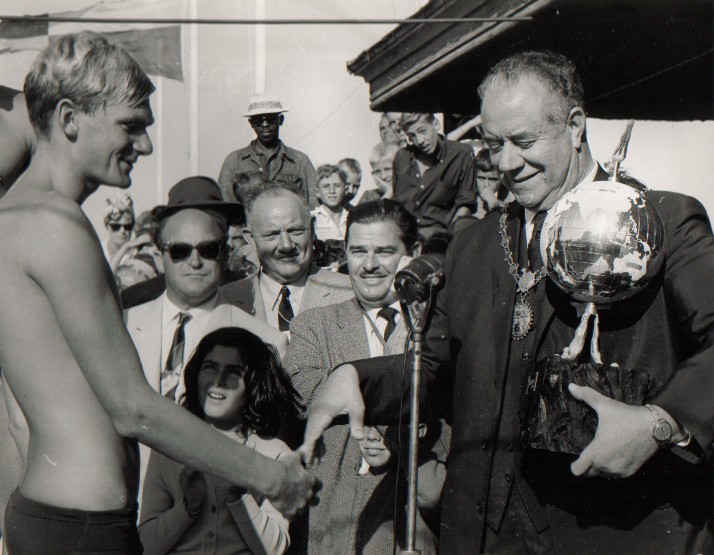
Geoff Grylls’s successes were not only on the surface of the water as a champion swimmer, but also underneath. He used natural skill and acumen to build a multi-million dollar enterprise extracting diamonds from under the sea in the world’s second biggest sea mining operation after the renowned de Beers Diamond Company. By Cecil Colwin
In swimming circles, world-ranked swimmer Geoff Grylls has long been known as a ‘River Rat’, a South African colloquialism for a person who thrives on swimming in rivers. He learned to swim in South Africa’s Swartkops River, a large river that flows into the Indian Ocean, near the city of Port Elizabeth. And this is where he later did most of his training. Like many a good swimmer before him, Geoff can’t remember when he couldn’t swim. From his early years, swimming has been an important part of his life. He liked being near water and was sailing his own yacht in open water at the age of eight. In the pool, while still in his teens, he began to win national and international freestyle swimming championships at every distance from the 100 to the mile. However, Geoff’s successes weren’t only on the surface of the water but also beneath it. From under the sea he built a multi-million dollar enterprise extracting diamonds in the world’s second biggest sea mining operation after the renowned de Beers Diamond Company.
Growing Up on the River
Talking about growing up on the Swartkops River, Geoff said that it was “a paradise, an adventurous place in which to grow up, just like Tom Sawyer’s life in a Mark Twain story. We all learned to swim, sail, row and do all sorts of water sports like canoeing, fishing and water skiing. ““We led a very unrestrained life, and once we had learned to swim, we were left pretty much alone all day. So we explored the river, seeing seagull nests, monitor lizards, snakes etc. Apart from swimming, we did a lot of sailing on the river, and this also became an important part of my life.”
Training in the River For Big Meets.
Throughout his competitive swimming career, even when he was a South African and British Champion, Geoff trained in the river for most of his big races. “I used to discipline myself to go down to the river and train, and hang a watch off one of the jetties in the river and swim between the jetties or across the river and back and record my times. That’s how I used to do my splits.” Asked how he was able to measure his speed over an unmarked distance, Grylls said, “I knew that the river was 100 metres across...approximately, depending upon the tide, and the distance between the jetties was approximately 50 metres. And, depending on which way the tide was flowing, my times would be different, and so I adjusted my times for the rate at which the tide was flowing and swam against myself!” Asked how he would know his reactions when he finally got into the strange surroundings of a marked-off swimming pool. Grylls replied: “Well, I didn’t know. In fact, the week before the 1964 National Championships, where I won all four South African freestyle titles, my coach Peter Elliott, commenting on his team in the local newspaper, said, ‘I have absolutely no idea how fit Geoff is because he swims in the river!’ . I used to train with Peter in his pool once a week and he would correct my stroke and give me time trials, but the rest of my training was done in the river. When I got into the pool, Peter merely checked my pacing and how I was moving in the water.”
Ilsa Konrad’s Reaction
Asked whether his coach commented on what times Geoff was clocking and what chances he stood in competition, Geoff replied: “Those sorts of things didn’t really worry me. I had a sort of ‘inner-confidence’, I did the best I could. I honestly think that this attitude kept me relatively unshackled... it kept me relatively fresh. In fact, in 1966, when Ilsa Konrads, the great Australian swimmer turned journalist, was in South Africa because she found this most intriguing, she wrote a long article on how I trained in the river all alone and kept improving.”
Swimming Alone in Open Water
“Eventually, this type of training was to condition me later for taking up open water racing because in 1964, the English magazine, “Swimming Times” in Britain, when discussing my winning all four British freestyle titles, said that I was ‘a star whose technique they couldn’t fathom. He has the ability to lift his head out of the water to look around and see how he was doing in the race without unbalancing his stroke.” Grylls said that when he eventually took up surf swimming and later ventured into rough water swimming, “it was the sort of freedom that I enjoyed. And since then, other than when I played water polo for Eastern Province and then Western Province, since those days at the end of the 1960’s I’ve been a loner. I’ve trained alone in the sea. For example, beginning in 2006, when I went to the World Life Saving Championships, during the preceding six months in training I trained alone in 14 different venues in four continents, mostly in the sea.”
‘Oceanic Repeat Swimming’
“I do train in the pool quite often now but most of my real hard training is only in the sea, and what I do is as follows: I know that I take 90 strokes for 100 metres. I have an unusually rapid turnover and so I do repeats by taking100 strokes flat out, then taking a rest time off my wrist watch, and then I keep doing 100 stroke repeats as hard and fast as I can, taking a rest in between... it’s a sort of oceanic repeat swimming! And so all my open water interval training is done in this fashion, varying the number of strokes, 100 strokes or 200 strokes, or if I’m speeding it up, on 50 strokes. For the last nine years, my companion Shirley and I have spent three months of every year out in the Mediterranean or in Croatia, where our yacht is moored, and the only place I’ve had to swim in, is the sea!”
Training and Meeting Challenges
Now in his sixties, Geoff is winning international open water long-distance events and life-saving competitions in his age group. He takes three or four months out in every year to sail his yacht in rivers and oceans around the world, stopping to train in an inviting bay or wherever he can find a likely rough water challenge in which to swim.
About Geoff Grylls:
Born 18 Sept 1943, Port Elizabeth SA. Height : 6 feet three inches. Present weight: 188 pounds, but down to 182when really training. (Grylls weighed about 165in pounds in his heyday)
Matriculated at Grey High School, Port Elizabeth, 1961.
Compulsory military training at the SA Air Force Gymnasium 1962. This Institution is very sport inclined and Grylls was given great encouragement with his swimming.
Bachelor of Commerce Degree, 1963/1966 The University of Port Elizabeth.
Named South African “Male Swimmer of the Year”, in 1962, 1963, 1964.
1962 Won the South African National 1650 yds title and swam for South Africa versus the visiting Japanese Team.
1963 Won the South African 220, 440 and 1650 yds freestyle titles. Member of the Eastern Province Team that won the National Championship 4 x110 medley relay and both the 4 x 110 yds and4 x 220 yds freestyle relay titles.
1964 Won every South African Freestyle title: 110,220, 440 and 1650 yds. Also won the 4.5mile Fish Hoek to Muizenberg swim in the Indian Ocean swim (Each swimmer had an accompanying personal board paddler because of sharks sighted in the Bay.)
1964 Member of the South African touring Team to England where he won the 220, 440, and 1650 yds British National titles, but heard that South Africa had been expelled from the Tokyo Olympics. No one realized that, as a Dual Citizen of South Africa and Great Britain, Grylls qualified for a British passport and as such, if selected, could have been permitted to compete in the Tokyo Olympics.
1965 Did not swim in SA Championships because of mononucleosis (glandular fever) and also missed the Fish Hoek Open Water swim.
1965 Member of the South African touring Team to England, where he won the 220, 440, 880 yds Freestyle British National titles and came second in the 1650.
1966 Scaled down his swimming activities as he was working full day, studying 5 university subjects and trying to train in between. As a result, he did not swim the 1650 in the South African National Championships, but came 3rd in the 110yds freestyle and won the 220 and 440 titles at the South African Championships.
1966 As a member of the South African Team toured USA and competed in the American National Championships in Lincoln, Nebraska, where he tied with 3rd fastest time in the 200 metres freestyle but was given 4th place time. Don Schollander and John Nelson were first and second, respectively in world record time. (Grylls beat the up-and-coming 16-year-old Mark Spitz in this race in which Spitz was swimming in his first National Championships.)
After these Championships Doc Counsilman offered Grylls the chance to do an MBA and train at Indiana University, but as South Africa was not permitted to compete in the 1968 Mexico Olympics, Grylls turned his back on competitive swimming and joined the Surf Lifesaving Association, which, “because of its humanitarian aspects”, continued to be internationally recognized.
Geoff Grylls discusses the differences between pool swimming and rough-ocean-water conditions
by Cecil Colwin
Swimnews - December 2011
In this issue, Geoff Grylls discusses the differences between pool swimming and swimming in rough ocean water conditions. "Regarding my feelings on open water and surf swimming, I think they differ from the general!} accepted view on age-group competitive swimming. We always tell young lifesavers that if they can afford a Speedo, they can afford to be an amateur lifesaver, which is what we mostly are. We have, therefore, been able to give a competitive break to poorer people who maybe cannot afford to pay pool fees, coach's fees, and the transport that often goes with it. If they can perfect sea swimming, particularly in rough water (and remember that we have competed at times in waves of around three metres that really negates the more perfect pool strokes), then they can become champions and perform a great public service."
Swimming in rough water
"Rough water swimming is sort of the same. I train almost exclusively in some form of rough water and find that in races, the rougher it gets, the better my relative performance gets. So if people live in remote places with access to open water, it does not stop them from swimming competitively. And then all sorts of other elements can come into it, like cold water, wind waves, sea waves, currents, and local nuances. All of these I find a challenge as against some guy with a stopwatch saying, 'You did better last week.' Different pressures!
"I find that I have a distinctive different stroke when swimming in the open water when there are waves, and this differs if there are big waves or slight chop. In the pool,l it is all about technique and rhythm, while in slight chop you have to ensure that the chop does not affect your rhythm. I know that I roll more when in choppy water and think that this is to ensure that my arm action is not affected. I also concentrate mainly on the entry and am quite aggressive when my arm is entering the water. I feel that if this part of the stroke is not being affected, then the rest of the stroke will sort of look after itself. If waves are going to upset your rhythm, they are most likely to do so when the arm is in the vulnerable position before entry. Also, in any rough water, I concentrate on my head position. This can easily be thrown off by waves or undulations in the water, so I concentrate on ensuring that my head position is correct. I actually feel that the upper part of my body is feeling quite rigid, if that makes sense."
Handling big waves
"In big waves (ie., more than surface chop), you have to really concentrate on your arm entry because sometimes there will be a gap where you think water will be and sometimes you push straight into a wave that may be above head height. So the concentration is on getting your ami into the water and ready for the stroke while not allowing your head position to be thrown off alignment. And you have to be able to miss a breath (or two!) as you fight your way through waves. In surf swimming, your breathing is hugely important and I train at mostly doing bi-lateral, and then doing some repeats while breathing every four or five strokes. "So to sum it up, I suppose that I concentrate almost exclusively on the forward part of the stroke, and I am prepared to shorten my stroke and fight the waves, rather than have a long 'pretty' stroke. I concentrate on body position and not being thrown off stride by missing breaths."
Choosing events
"I'm careful in choosing the events I enter because I don't want swimming to dictate my life; I choose a couple of races a year and this gives me something to train for, otherwise I get lazy. So for instance, In 2009 I did the Midmar (first in 60+) , then last year the La Jolla rough water mile (won 65+ and defended again this year), and this year won the Aumakua Mile in Maui and also swam in the Maui Channel Swim in a team. (That was a rough swim this year.) "
In 2012, I think I will do the Stari Grad swim in Croatia in August, and I usually swim in the South African Masters Surf Lifesaving Championships in March each year. Just for old- times' sake, I often also do the Redhouse River Mile in the Swartkop River, near Redhouse, the village where I was brought up. It is the oldest open water race in South Africa, having started in 1928."
Interest in surf lifesaving
When Grylls gave up pool swimming, he went into Surf Lifesaving, where he said, "We were still accepted internationally, and I was in a South African team that competed against Australia. I've continued my interest in lifesaving all these years, and have put my efforts into the sport administratively as well."
Geoff was on the South African Lifesaving executive for many years and a couple of years on the international committee for the sport in Lifesaving. "I competed in the international masters in Florida. Italy, and Australia for instance (winning a couple of golds), but once again I didn't want competitions to dominate my life, which has been all about fun and moderation!"
The dangers of "River Monsters"
"Each year between Christmas and New Year, we swim a mile race at the mouth of the large Breede River in South Africa. Two years ago. Two weeks after our swim, the biggest Bull Shark ever (4 metres) was caught in the Breede River three miles upstream (!) from where we swim!
"The television program 'River Monsters' featured these large Bull Sharks (we call them Zambezi River Sharks) that are caught in the Breede River. They released this record-sized shark after putting a monitor on it and tracked it swimming past our house, which is 20 miles upstream. Training in the River now is a bit problematic mentally and so I only do kayaking when I am there now! Meanwhile, the Breede River Swim still continues each year!"
Grylls said that sharks are generally becoming a problem to open-water swimmers. He mentioned a favourite place in Plettenberg Bay where he regularly goes bodysurf training. "Last month, just around the rocks (about 200 metres away) a surfer was killed by a shark, and in October, a British tourist was taken by a shark at Fish Hoek (check YouTube), the second death this year in the same vicinity."
Offshore yacht racing
Geoff keeps a cruising yacht in Croatia, a standard Beneteau 4l foot, with three berths, called LilUi. "It is not spectacular in any way, but provides us with a 'wet RV and, although we often have friends aboard, Shirley and I can handle it easily together. In fact, often when I am away, swimming or on business, Shirley (also a qualified skipper) continues sailing. We spend three to four months each year cruising in the Adriatic. We have done a great deal of offshore sailing, fifty miles from land, often in big seas that sometimes run off the southern coastline of South Africa. Although now I'm beginning to prefer more leisurely cruising, I have a full-on 43-foot racing yacht in Cape Town in partnership with a friend who owns one of the biggest sail lofts in the world. This is the vessel in which we now do offshore racing but only around the South African coast. Most of our deep water cruising recently has been in the Mediterranean and we have been in some storms during this time, but nothing really dramatic, except maybe one night when our mainsail got ripped to shreds. But we were on a bigger yacht and our two-member crew was very proficient."
The difficulties of worldwide training venues
Geoff said that his adopted lifestyle made it difficult to get into a regular, rigid routine. "For instance, when I was training for the 2006 Masters World Lifesaving Champs in Australia, I trained in 14 different venues in four continents in the six months prior to the event. Because of our leisurely lifestyle, most days when we are sailing, we anchor in a bay or small village where I just jump overboard and swim. There is no scientific means of measurement, but I still use my old method of doing my repeats on 100 strokes, rest, etc. If the sea is rough, I swim out of the bay into the open sea to keep my rough-water style going. I don't do much distance, maybe 1000 to 1500 metres every second day or so. I do very little pool swimming now, probably because I feel the drudgery of swimming up and down in an enclosed space. And, to be fair, I suppose because it doesn't fit in with my chosen lifestyle."
The last ten years' lifestyle of racing and sailing
"To explain our lifestyle, in the last 10 years, Shirley and I have lived a very unstructured life. A lot of what we do is spontaneous and is probably why I have such alternating training routines.
For instance, we have
- sailed in the Med for three months, sailing first from Barcelona to Naples, then cruising all over the Med and Adriatic, ending up in Venice; as well as
- racing in Antigua week;
- spending 5-4 months each year sailing in Croatia and driving through the countryside and islands;
Lifesaving as a sport simulates actual lifesaving techniques
Geoff described how lifesaving is a sport that trains swimmers for the real thing. "The events are made to simulate rescues so as to improve techniques in actual rescues. Buoys are set out between 200 to 2S0 metres apart, depending on tides, and sometimes huge surf that could be breaking around the buoys. A swim race would, therefore, be between 400 and 500 metres long, and a rescue belt race between 200 and 250 metres apart.
"Sometimes the events are cancelled if the surf is excessive, but only in real storm conditions. The guys rough it out through big swells. But that is only part of it, because spotting rips and catching waves make a huge difference. And 'pretty' stroke work does not always help! So as you get older, you may get slower but you do get wiser, and that leads to longevity in the sport."
- also sailing a few times in Greece, Thailand, and the Seychelles;
- touring the Baja peninsula in Mexico for a month, surfing, and living most of the time on beaches in a tent;
- driving from the West Coast of the USA to the East Coast;
- driving from Key West to the top of Florida on the coast road;
- driving along the Carolina and Georgia coast;
- following the South African "Springbok" rugby team through England, Ireland, Wales, and Scotland for a month
- visiting Mauritius a few times, and also Zanzibar and Cuba;
- swimming in World Masters Lifesaving Championships in Florida (2002), Italy (2004), and Australia (2000), touring Tuscany and the Australian countryside after the event"
Combining business with surf lifesaving and world master events
In 1962, Geoff met John Whitley, a prominent South African swimmer, while serving in the South African Air Force. The) were both radar controllers taught to monitor fighter planes in the air. "But because we were always getting time off to train or compete, we really did not do much. Since then, we have swum all over the world together and 1 invested in his very successful business in the USA. John now swims in most US and World Masters events. My association with him requires me to visit the US twice a year on business, and I visit London al least twice a year also on business, so trying to set a routine training schedule is not easy! I introduced John to Surf Lifesaving, and he competed with me in World Masters in 2002, 2004, and 2006. He is exceptionally good at events using flippers and has won a few golds at these events. John is a great student of stroke technique and really is my coach, correcting my faults when we meet. His training is more orthodox than mine, but he encourages me and understands my wayward ways! Incidentally, John has built a very impressive business in the US and Canada. (The largest private pest-elimination business and leading food-safety company in North America)."
Building a Successful Business Career
Geoff Grylls said that he had rarely been employed working for a salary. When asked how he had become so successful in business, he said: "A couple of us started a finance business in 1976 that arranged complicated financing for projects, particularly in the local authority and parastatal field. We did not require capital and in fact we placed a lot of business with banks. But we built up a portfolio of clients and eventually were bought out by a bank, and that gave us the capital to go into more capital-intensive projects."
Grylls, now reputed to be one of South Africa's multi-millionaires, said that it was "not really a grand plan, but rather that we took opportunities as they arose and managed to build up a capital base of our own. Later we obviously did use bank financing in projects and so built up a bigger portfolio. We had some disasters but mostly winners! I suppose we came out on the right side. Mine was not a classical case study, just opportunism. And some luck of course!"
Dubbed a "serial entrepreneur"
Geoff Grylls has long been dubbed a "serial entrepreneur." A serial entrepreneur will often come up with an idea and put some money into the project to help get things started, but then pass the responsibility to someone else and move on to a new idea and a new venture. Geoff said after selling the finance company in the mid-1980s to a bank: "After that, I started an offshore diamond mining business that eventually became the second biggest in sea mining (after de Beers).
"I have since financed young entrepreneurs in the US, Europe, and South Africa in various businesses, but always based on my assessment of the integrity and capability of each individual. In most cases, these people have been very successful. It seems that the less I did, the more successful they became, so that led to a seamless choice of a life of travel and sailing! I hope Ibis makes sense. I could be more specific if you require it, but then this would become time-consuming and more of a business story than a swimming one!"

Swimming legend returns to action
Six-time River Mile winner, 70, to have another crack
13 Feb 2014
IN an event which turned him into a South African swimming legend, 70-year-old Geoff Grylls returns to action this weekend to acknowledge the part the Spar River Mile played in his long career. One of South Africa’s champion swimmers in the 1960s, Grylls will swim in Sunday’s event in the Sundays River six years after last competing in the race.
“My last time was the first race at Sundays River, and it’s just that other things I do such as yachtin,g have clashed with the date of the River Mile,” Grylls said yesterday. “But I am really looking forward to the event. I have always said that these types of events need to be supported, and I would like to acknowledge what the River Mile has done for me.”
Having grown up on the banks of the Swartkops River, Grylls soon became a popular winner and held the record of consecutive wins – six times from 1960-65 – until the mark was passed by Velia Janse van Rensburg (in the photo left)in 2008 when she won her seventh title in a row, and eighth overall.
In an interesting article in a Canadian publication, Swimnews, Cecil Colwin described how Grylls became one of the most famous open water swimmers in the world.
He wrote that Grylls had been known as a “River Rat”, referring to a person who thrives on swimming in rivers.
Talking about growing up on the Swartkops River, Grylls said it was “a paradise, an adventurous place in which to grow up, just like Tom Sawyer’s life in a Mark Twain story”.
“We all learnt to swim, sail, row, and do all sorts of water sports like canoeing, fishing and water-skiing.”
Throughout his competitive swimming career, even when he was a South African and British champion, Grylls trained in the river for most of his big races.
“I used to discipline myself to go down to the river and train, and hang a watch o one of the jetties in the river and swim between the jetties or across the river and back, and record my times. That’s how I used to do my splits,” Grylls said.
Asked how he would know his reactions when he finally got into the strange surroundings of a marked-off swimming pool, Grylls replied: “Well, I didn’t know. In fact, the week before the 1964 National Championships, where I won all four South African freestyle titles, my coach Peter Elliott said ‘I have absolutely no idea how fit Geoff is because he swims in the river!’
“I used to train with Peter in his pool once a week, and he would correct my stroke and give me time trials, but the rest of my training was done in the river.”
Asked whether his coach commented on what times Grylls was clocking and what chances he stood in competition, he replied: “Those sort of things didn’t really worry me. I had a sort of inner confidence. I did the best I could. I honestly think that this attitude kept me relatively unshackled. It kept me relatively fresh.”
Grylls said when he eventually took up surf swimming and later ventured into rough water swimming, “it was the sort of freedom that I enjoyed”. “And since then, other than when I played water polo for Eastern Province and then Western Province at the end of the 1960s, I’ve trained alone in the sea.”
Grylls has retired, although he still has business interests which take him around the world. Whenever he gets the chance, he dips into the ocean or a river for a swim. Now he will be returning to celebrate the River Mile’s 90th anniversary, a fitting tribute both to the race and a River Mile legend.

Geof Grylls Article
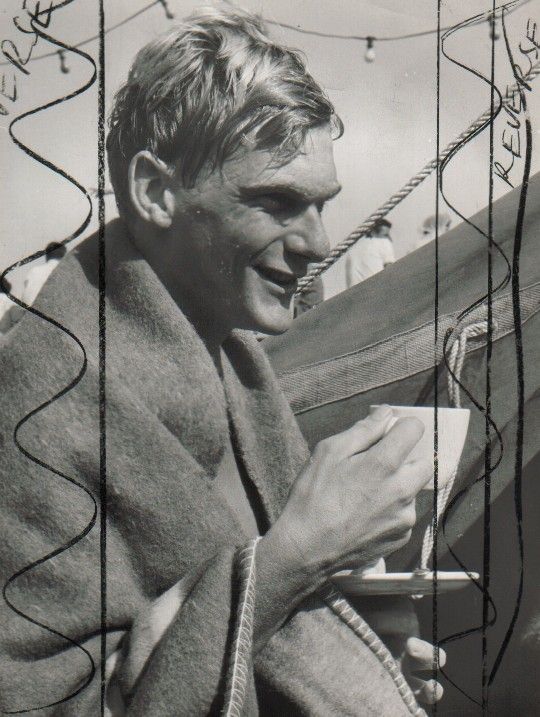
Grylls Geoff Ep Nov 1964
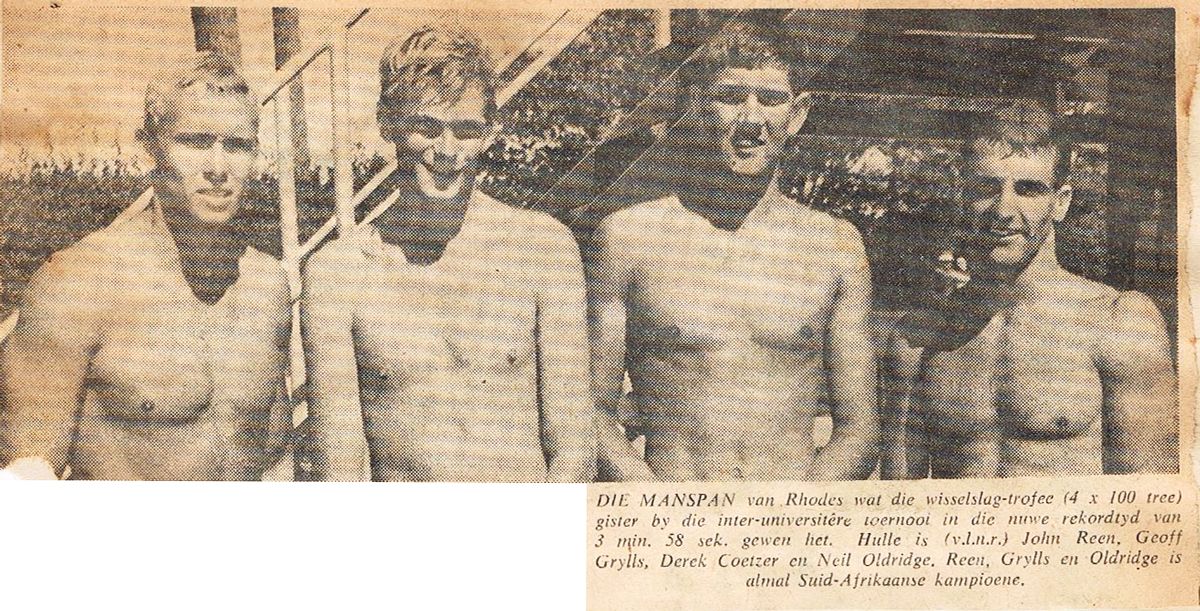
Grylls And Oldridge At SAU
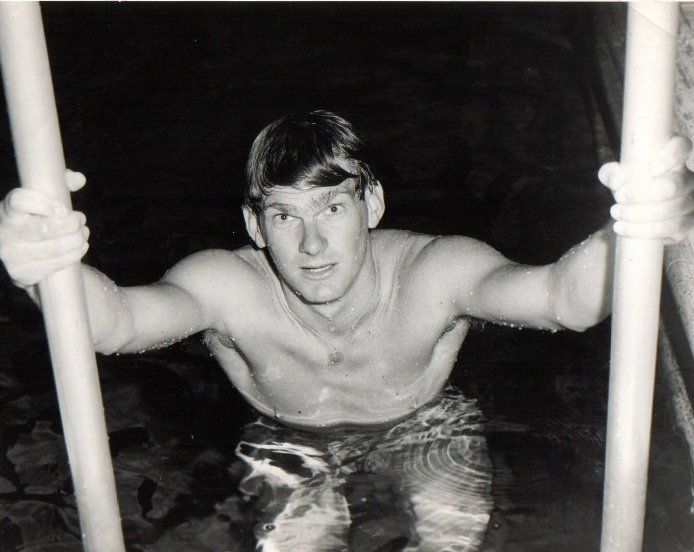
Grylls Geoff Nov 1964
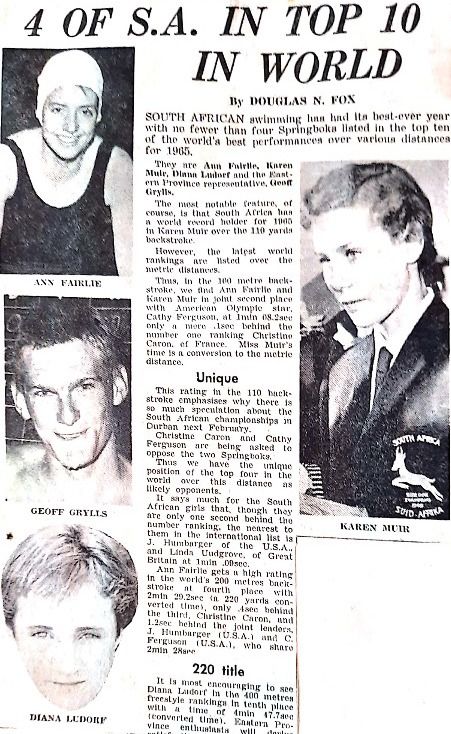
IMG 20201013 WA 0003

IMG 20201013 WA 0007
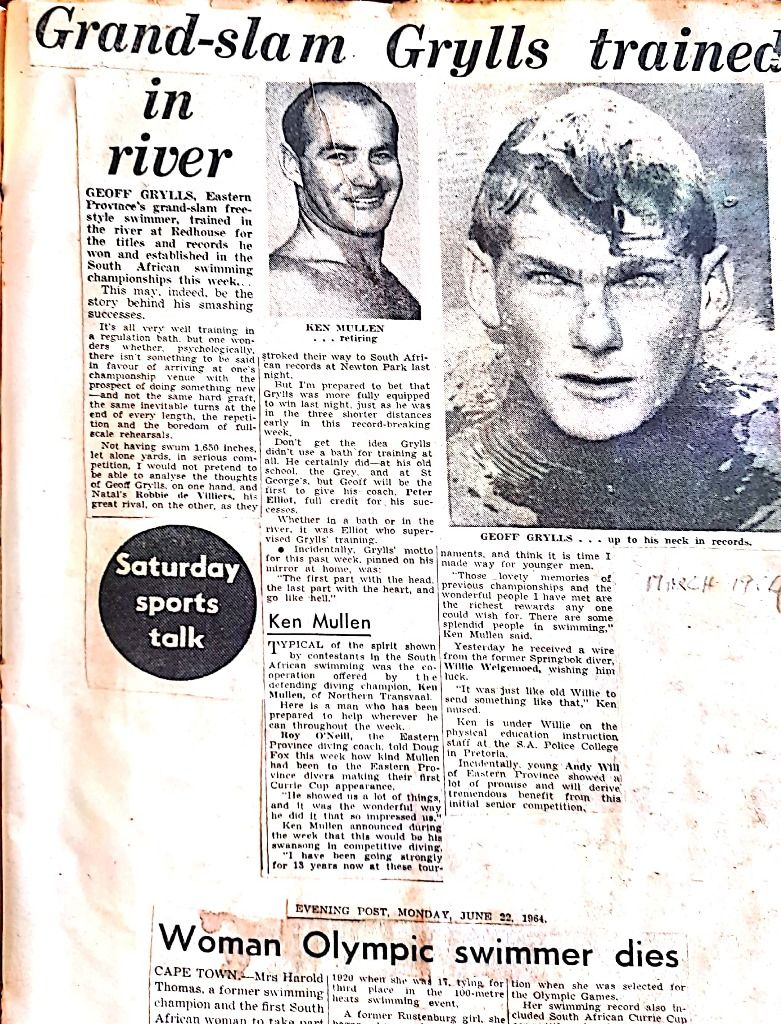
IMG 20201013 WA 0008
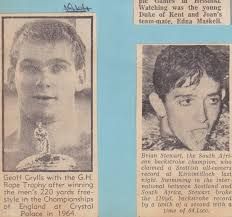
IMG 20201013 WA 0012
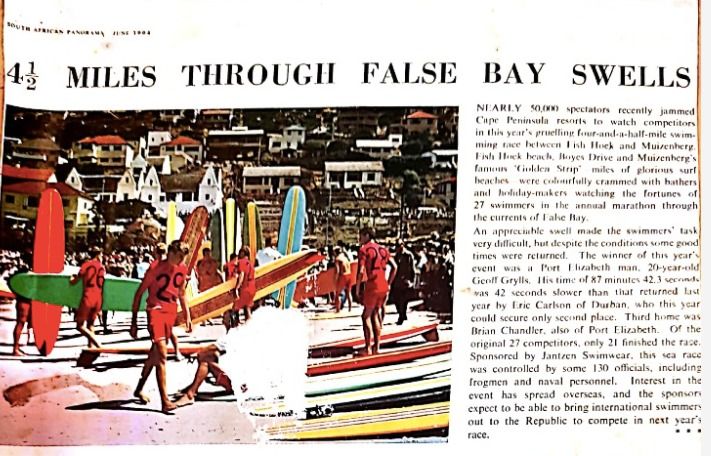
IMG 20201013 WA 0020
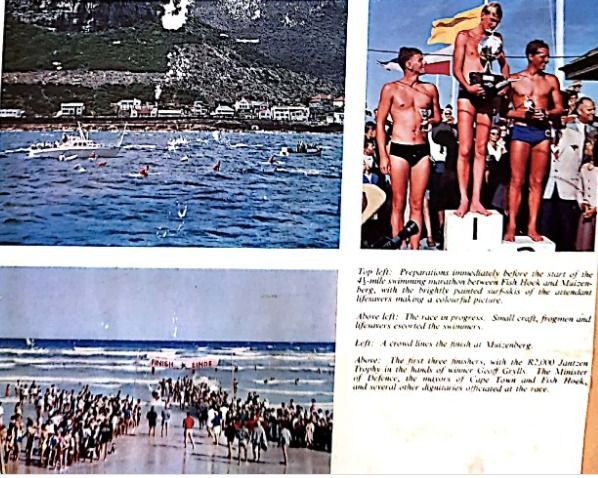
IMG 20201013 WA 0021
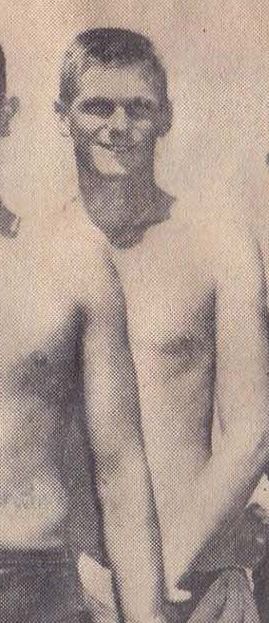
IMG 20201013 WA 0023
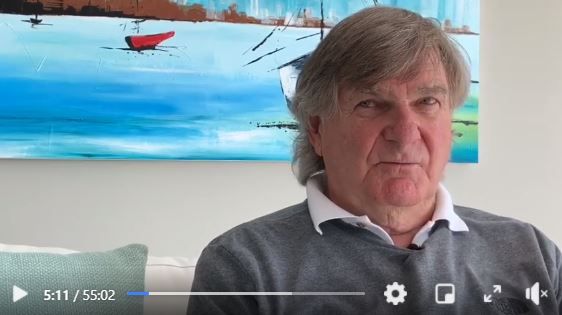
Interview
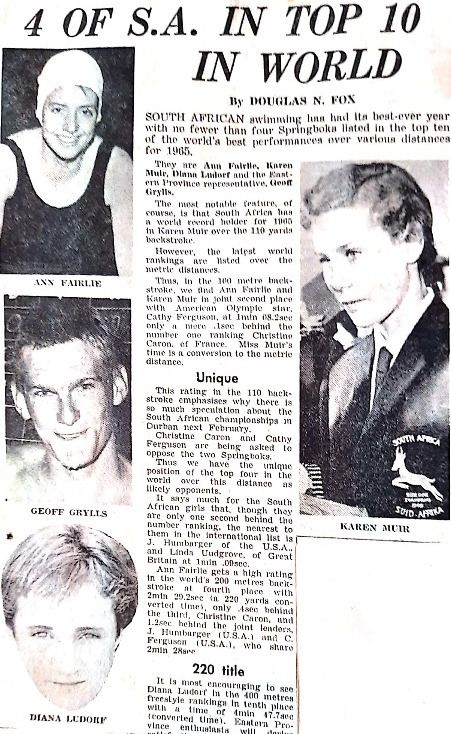
Whats App Image 2020 10 13 At 10 42 02 AM 1
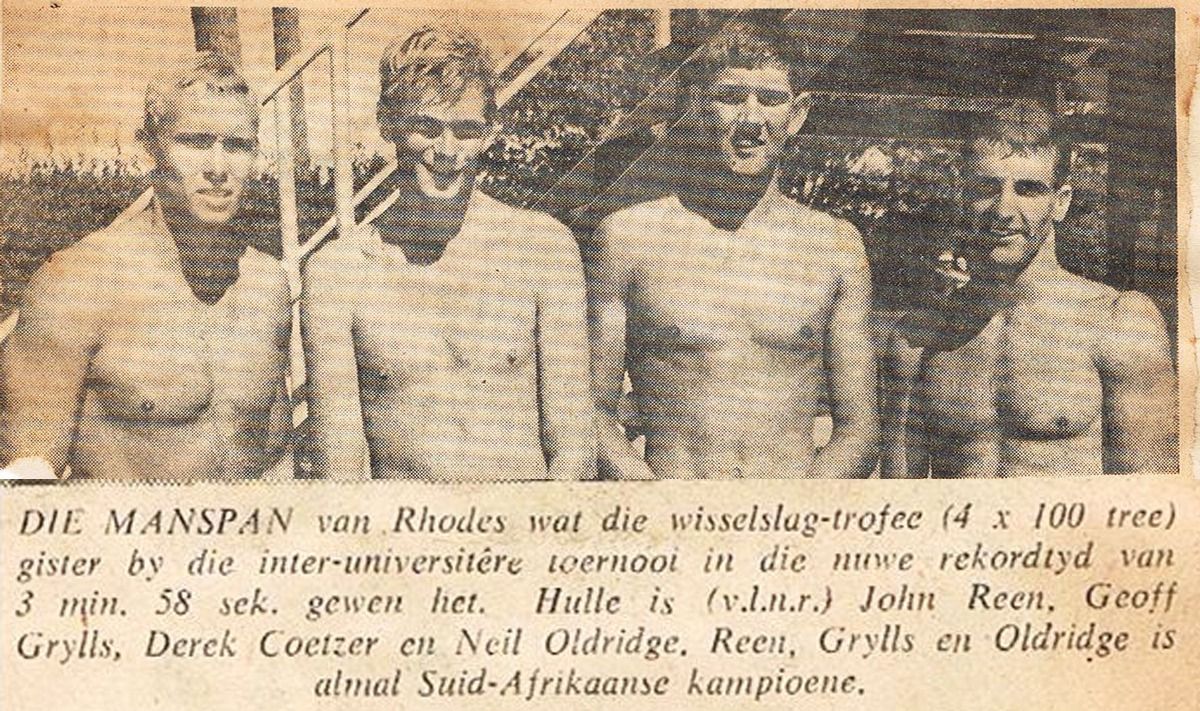
Whats App Image 2020 10 13 At 10 42 54 AM
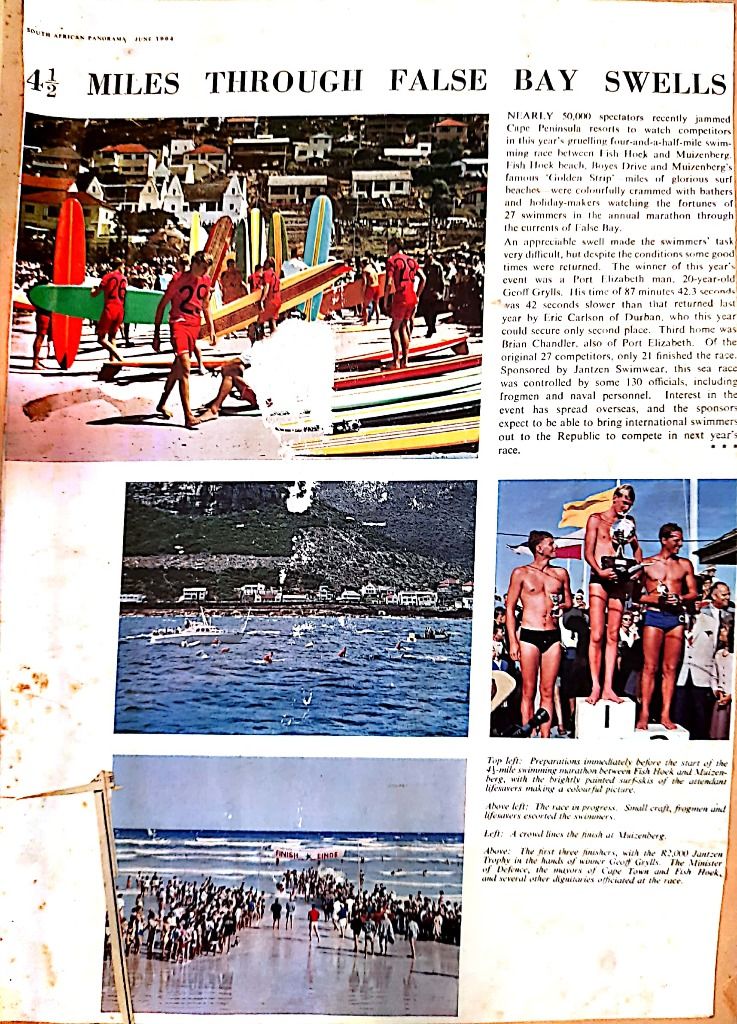
Whats App Image 2020 10 13 At 104202 AM 2
